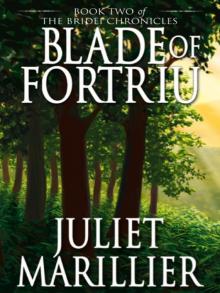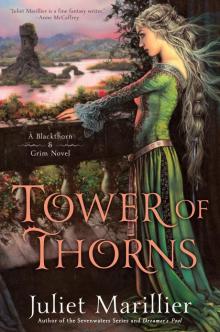- Home
- Juliet Marillier
Wildwood Dancing Page 12
Wildwood Dancing Read online
Page 12
I walked all the way down to the village. Behind the carved gates of each smallholding, cows lowed and chickens squawked. Here and there, a woman swathed in shawls and scarves could be seen on the muddy pathway, carrying a bucket or a bundle. A long cart loaded with logs passed by, pulled by a pair of heavy horses. Red tassels dangled from their bridles, a charm against evil spirits. The logs would be from Cezar’s plantation, and destined for Braşov. I stopped by Judge Rinaldo’s house to offer his wife our regards. She invited me in for a glass of rosehip tea and expressed the hope that Aunt Bogdana would be ready for visitors soon. I did not tell her that even we had been told to stay away.
The village church stood on a little hill, its pointed wooden roof reaching toward heaven. I wavered outside, tempted to seek out Father Sandu, but not sure exactly what I wanted of him. I could not speak of Night People. I could have asked him to pray for Father’s recovery, but in the end I walked past, for it was early and I did not wish to disturb the priest without good reason. The shutters of his little house were closed fast. I headed back past Ivan’s place and his wife gave me a small pot of honey. I suspected that she could ill spare it, but it was impolite to refuse such a gift. Iulia would be happy, I thought—Tati or I could use this to bake something sweet. Maybe Florica had some nuts hidden away.
Gogu and I made our way back into the castle courtyard under a light falling of snowflakes. I was planning what I needed to say to my sisters. I’d start with an apology to Iulia for hitting her. What she had said to me last night, about letting Gogu go, had made perfect sense. She could not know the mixture of grief and guilt that had made me strike out at her. I would tell them how sorry I was that I hadn’t specified we were not supposed to mix up the funds. I would explain truthfully that we had been quite short on both foodstuffs and silver even before Cezar had walked off with our two coffers, and that I had no intention of begging from him. Then they could give me their ideas on how we might get through the winter. I began to feel a little better. Admitting I was wrong did not come easily to me; I preferred not to make errors in the first place. But today, with the echo of Tadeusz’s soft voice in my ears and his touch fresh on my skin, I knew I must make peace with my sisters and allow them to help me.
Horses.
“What?”
Horses. Visitors.
Gogu was right. Tied up before our front door were my cousin’s black gelding and two other mounts.
“A pox on Cezar!” I lengthened my stride, putting a hand up to balance the frog. “He’s the last person I want to see this morning.”
The morning after Full Moon wasn’t the best time for us to receive visitors. We tended to be tired and cross after too little sleep. In the kitchen Florica was brewing fruit tea and Iulia was slicing a loaf of bread while Paula put out dishes of plum preserve. Stela was setting out glasses and plates—she looked so weary, she could drop something at any moment.
Cezar was talking to Tati, who was pale and drawn and did not seem to be paying much attention. My cousin’s two friends sat at the table. Cezar had met Daniel and Rǎzvan during the years of his formal education in Braşov. They were landholders’ sons, the kind of young men deemed suitable to be future husbands for girls like us. I thought Daniel supercilious and Rǎzvan rather slow. Both were of solid build, like Cezar, and their interests ran along similar lines: hunting, drinking, and discussing their own exploits loudly and at length. The kitchen was full of their presence; I felt as if we had to shrink to make room for them.
Stay calm, Jena.
“Cezar.” As I walked in, the eyes of the three young men traveled from the frog on my shoulder down to my wet boots and the sodden hem of my gown. “Another surprise visit?” I saw something on the table next to Tati’s tea glass, and my heart lurched. Instantly, Cezar was forgiven. “A letter! A letter from Father?”
My cousin had risen to his feet as I came in. Now he stepped forward and took both my hands in his. I resisted the urge to snatch them away. “It is from Constanţa,” he said. “But this is not Uncle Teodor’s writing. Paula tells me it is that of his secretary.”
“We waited for you, Jena.” Paula was solemn. In her eyes I read the unspoken message: if it was bad news, it would be best if we all heard it together.
“Father often gets Gabriel to address his letters,” I said, picking up the folded parchment and reaching for the bread knife. I willed my fingers not to shake. “Thank you for bringing this, Cezar.”
“I’m at your disposal, as you know. This came with a representative of my agent in Constanţa. The man had not seen your father, only a messenger, who left this with him. I have no further news for you.”
“Excuse me.” I couldn’t ask him and his friends to leave the room, although I dearly wanted to be able to read Father’s letter in private, with just my sisters around me. I went over to the stove, my back to everyone, and slit the seal.
I saw immediately that the message, too, was in Gabriel’s writing. My heart plummeted with disappointment. I scanned the letter quickly. If it was the worst news, I needed a moment to collect myself before I told them. I cleared my throat, swallowing tears.
“ ‘My greetings to you, young ladies, on your father’s behalf,’ ” I read aloud. “Teodor is still too unwell to write. The cough has deepened and is causing his physician grave concern. Rest assured that everything that can be done will be done.
“ ‘Your father is not able to send any instructions for the conduct of his affairs while so severely debilitated. I am aware that you have Salem bin Afazi’s consignment in storage …’ ” As I spoke, my eyes were scanning the next section of the letter, in which Gabriel suggested that I ask Cezar to deal with the selling of Father’s precious goods. I decided I would not read this part aloud. “ ‘A decision was made not to give your father the news of his beloved cousin’s tragic and untimely death as yet. His physician believed that such a blow could well prove fatal. I would ask that if you write to your father, you take care to shield him from this news.
“ ‘I will dispatch this by Cezar’s agent and hope it reaches you safely. Of course, I will remain by your father’s side through this difficult time. As instructed, I have sent word to Dorin that he should not return to Piscul Dracului until he hears from me again, since, in your father’s absence, there will be little employment for him there. Your obedient servant, Gabriel.’ ”
There was a silence after I had finished. Looking from one sister to another, I saw the same look on all their faces. It perfectly reflected what was in my own heart: the cold realization that our worst fears were coming true. Grave concern. Severely debilitated. Could well prove fatal. Those phrases seemed to add up to only one thing: we’d probably never see our father again.
After a little, Florica carried the teakettle over to the table and set it down with a rattle. “Praise God, your dear father is still with us,” she said, raising a hand to wipe her eyes. “Master Cezar, will you take tea?”
“I’ll pour it,” I said, wanting a job to help me stay calm. “Rǎzvan? Daniel? I’m afraid we have only bread to offer you.”
“Ah, how could I forget?” Cezar got up and fetched a capacious basket that had been set by the door. “I’m sorry there isn’t better news to celebrate, but Florica is right—we should be glad Uncle Teodor is still clinging to life. I brought you some supplies, a few little delicacies. I had a feeling you might be running short. Here.” He set the basket on the table and unfolded the cloth that lay over its contents. A delicious smell arose. “Our own store cupboard is amply stocked,” Cezar said. “My steward attends to it diligently. We can certainly spare this. Nuts, honey, a little wine for you older girls, some preserved fruits … And I had our kitchen people make some spice cakes. We could sample those with the tea. You look as if you need a treat.”
I wonder what he wants.
Gogu’s suspicions mirrored my own. I was uncomfortable with Cezar in the role of benefactor. His good deeds were seldom performed without some expectation of
gain for himself.
“Oh, Cezar, how lovely!” Iulia’s cheeks were flushed with pleasure. I noticed Rǎzvan staring at her in what appeared to be admiration. When she leaned forward to examine the basket’s contents, he was taking in the view down the front of her day dress. I frowned at my sister, but she did not seem to notice.
It was clear that Tati wasn’t going to say anything. Daniel was seated opposite her. She sipped her tea and stared through him.
“Thank you, Cezar,” I made myself say. “I’m sure I speak for all of us when I tell you how welcome these small luxuries are.” I noticed that he was wearing his father’s gold chain again, the one with the miniature hunting horn—perhaps he wore it all the time now.
“Jena?” The little voice was Stela’s.
“What is it, Stela?”
“Is Father dying? Is that what it means, severely debil—debili—”
“Debilitated just means tired and weak.” Paula spoke firmly. “Father needs more rest, that’s all. He’ll be home in springtime.”
We sat awhile over our feast. Cezar did most of the talking. I had several questions in my mind, questions I could not ask. It seemed to me impossible that Gabriel would have opened my private letters; my father’s secretary was the soul of propriety. Yet, if he had not, how could he have shielded Father from learning of Uncle Nicolae’s death? Evidently Gabriel himself had been given the sad news. Had Cezar had a hand in censoring my correspondence? Gabriel had said, if you write to your father—if, not when. Was it possible that my letters had never reached Father in Constanţa? And who had decided that we didn’t need Dorin back? An able-bodied young man to help Petru would be worth his weight in gold right now.
I waited for an opportunity to ask Cezar about this, but he was holding forth on the perils of the wildwood, one of his pet subjects, and I couldn’t get a word in edgewise. Nobody was arguing—today, none of us sisters had the energy or the heart to challenge him. After a while my attention drifted, my thoughts going over the events of last night: the look in Tadeusz’s eyes, the honey in his voice, the things he had told me. I could not think why I was the one he had singled out, nor what he hoped to gain by it. In the ancient tales of Transylvania, Night People were not known for doing people favors.
“You’d do well to let me deal with the lower reaches of the Piscul Dracului forest as well, Jena,” my cousin was saying. “Since I’ll be hiring men to fell the trees around my own house, they may as well be put to work on Uncle Teodor’s land straight afterward. We could have the immediate area fully cleared by the end of spring. And the timber would fetch you a tidy profit.”
“What?” I must have sounded stupid. I had only just realized what he was talking about.
“My project Jena.” Cezar’s tone held exaggerated patience. “Rendering my property, and Uncle Teodor’s, safe from the malign presences that haunt these woods.”
Your cousin wants a hand in everything. He wants control.
“You can’t do that, Cezar. Folk may be afraid of the beings that dwell in the wildwood, but I doubt very much that the people of the valley would support what you suggest.” I glanced at Florica; she had gone extremely pale. “Felling the trees over a wide area would only anger those presences. It could bring down retaliation on everyone in our community.” Then, seeing the way Cezar was looking at me: “At least, that’s what most folk will believe. As Florica said once, if you give respect, you get respect back. If you offend, you get … retribution. Nobody will be prepared to work for you on this. Anyway, you can’t do anything here at Piscul Dracului without Father’s permission.”
Cezar’s mouth went thin, his eyes turned cold. “It offends me to hear such sentiments issuing from your lips, Jena. I will do you the favor of putting it down to your innocence.”
He means ignorance.
“Since you speak of offense and of retribution,” my cousin went on, “I must point out to you that there could hardly be a greater offense than robbing a boy of a beloved brother. I’ve waited years to dispense due punishment for that. The trees are only the first step. As for workers, a man whose family is starving cannot afford to refuse employment on the basis of superstitious fear. Besides, it’s easy enough to bring in labor from farther afield: men who don’t know the peculiarities of this particular forest.”
The atmosphere in the kitchen had turned decidedly chilly. Nobody else was saying a thing, though I could see that Paula was bursting to speak. I gave her a warning glance. We were all tired and upset; this was the time not for challenges, but for wise silence. Cezar’s friends had the grace to look a little embarrassed as they applied themselves to the food.
“Enough of this,” Cezar said abruptly. “Jena, I want to look over the accounts while I’m here. I trust that your sisters can keep my friends entertained?”
“Of course,” said Iulia, who had seated herself between Rǎzvan and Daniel. Now that she had had her treat, she was in the best of tempers and making the most of her position—smiling shyly, batting her eyelashes, and plying the young men with cakes. I did not like this new behavior at all; I preferred her childish bursts of giggling. Even Cezar was stealing glimpses at her.
“Well,” I said, rising to my feet, “let’s get on with it. I don’t imagine Daniel and Rǎzvan will be wanting to stay too long. Florica, perhaps you could make more tea for our guests? Paula, please come with Cezar and me. Bring a book.”
“Oh, by the way,” Cezar said as the three of us made our way up the narrow stairs to Father’s workroom, “I noticed on the ride here that you’ve had all the fencing repaired up by the top pastures. I imagine you’ll be needing some funds to pay your workers. Who helped Petru with the job? It’s been expertly done—Jena? Is something wrong?”
“Oh—oh, no, nothing.” My head was in a whirl, my stomach churned. The fencing all done between last night and this morning? It was not possible. Petru had been working in the barn when I left on my walk. He had still been there when I returned. Besides, even with two or three men, the fencing job would have taken several days. Grigori? No, I had asked him not to risk his safety, and I knew he would not act against my wishes. My heart sank. Tadeusz. It was the only explanation. But I had never asked for his help. I had not accepted his offer. In the back of my mind, I heard his deep, dark voice: If you require proof of my good intentions, I will give it, Jena. “I don’t need funds, Cezar. Some travelers came by and offered to do it for food. I’m glad it was a good job; I haven’t had the opportunity to go up and check it yet.”
Once in the workroom, Paula seated herself at Gabriel’s desk in the corner, while Cezar and I took opposite sides of the table.
“What is it you want to see?” I asked him, reaching for the current folder of receipts and payments. My hands were shaking. I thought of Tadeusz and his pallid crew up on our fields, walking in our world, setting their elegant hands to straightening withes and tying up fencing twine on our very own land, a stone’s throw from where I and my sisters were sleeping. I thought of them prowling around our sheepfolds. What if someone had seen them?
“Are you sure you’re quite well, Jena?” Cezar was regarding me closely. “You look very pale.”
“I’m fine. There’s no need for this, Cezar. The ledgers are up-to-date and everything balances. There’s absolutely no reason for you to check on me. Especially now you’ve taken away the funds. There will be nothing for me to record until you give control of them back to me.”
He smiled indulgently, as if I were a precocious infant. Then, as quickly, he was serious again. “I have something to tell you, Jena,” he said. “It concerns the priest’s visits to this house. I imagine you can guess what it is.”
He had my full attention now. “What have you done?” I asked him, and heard the frost in my own voice. I could not look at Paula.
“I took action, as I advised you I would. I had a word with Father Sandu’s superior. Were you aware that these lessons were never officially approved by the priory? That your father made
a private arrangement with this priest to tutor young Paula? Even you must have been aware of how unconventional such behavior was.”
“What do you mean, behavior?” Paula was on her feet, shaking with rage. “Father Sandu tutors the sons of many families in the district, you know that. How dare you imply there’s something illicit about this? All he does is treat me the way he’d treat a boy student.”
Cezar gave a patronizing smile. His eyes were cold. “Exactly,” he said.
Arrogant fool.
“Tell us!” I was holding on to my temper by a thread, and willing the frog to keep his thoughts to himself. “What did you do?” In my mind I saw the closed shutters of Father Sandu’s little house.
“I have not done as you seem to believe. I did not request that the priest cease his visits to Piscul Dracului. All I did was let his superior know what was going on.”
“You must have realized that would have the same result,” I said.
Now the little smile was turned on me. “Well, yes, in fact, the good Father will not be coming here any longer.” Cezar’s tone was rich with self-satisfaction. “A decision was made to recall him to the priory near Sibiu. It happens sometimes: a priest working alone—in a remote corner of the country, out of touch with his brethren—can lose his way a little. I believe they’re sending a replacement to the district as a matter of urgency.”
Paula got up and, clutching her book to her chest, walked out of the room in total silence. Her face was sheet-white, her jaw clenched tight. If she planned to shed tears, it would not be in our cousin’s presence.
“How dare you!” My rage burst out of me. “You don’t even realize what you’ve done, do you? This isn’t just about Paula, Cezar. Father Sandu’s been here far longer than we have. He’s married people and baptized their babies and buried their dead in this community for years and years. People trust him. They rely on him. You’ve done this without even thinking about what it will mean for the valley!”

 Den of Wolves
Den of Wolves Flame of Sevenwaters
Flame of Sevenwaters Blade of Fortriu
Blade of Fortriu Wildwood Dancing
Wildwood Dancing Dreamer's Pool
Dreamer's Pool Raven Flight
Raven Flight Heir to Sevenwaters
Heir to Sevenwaters The Dark Mirror
The Dark Mirror Daughter of the Forest
Daughter of the Forest Seer of Sevenwaters
Seer of Sevenwaters Tower of Thorns
Tower of Thorns Shadowfell
Shadowfell Wolfskin
Wolfskin The Caller
The Caller Foxmask
Foxmask Harp of Kings
Harp of Kings The Well of Shades
The Well of Shades Heart's Blood
Heart's Blood Child of the Prophecy
Child of the Prophecy Twixt Firelight and Water
Twixt Firelight and Water A Dance with Fate
A Dance with Fate The Harp of Kings (Warrior Bards)
The Harp of Kings (Warrior Bards) Daughter of the Forest (The Sevenwaters Trilogy)
Daughter of the Forest (The Sevenwaters Trilogy)![Sevenwaters [06] Flame of Sevenwaters Read online](http://i1.bookreadfree.com/i2/04/08/sevenwaters_06_flame_of_sevenwaters_preview.jpg) Sevenwaters [06] Flame of Sevenwaters
Sevenwaters [06] Flame of Sevenwaters![[Sevenwaters 04] Heir to Sevenwaters Read online](http://i1.bookreadfree.com/i2/04/12/sevenwaters_04_heir_to_sevenwaters_preview.jpg) [Sevenwaters 04] Heir to Sevenwaters
[Sevenwaters 04] Heir to Sevenwaters